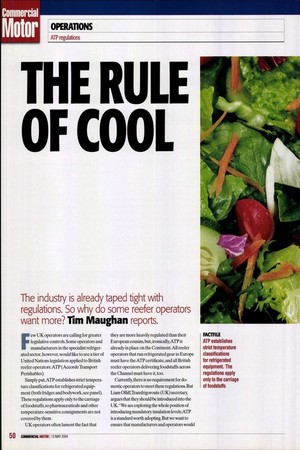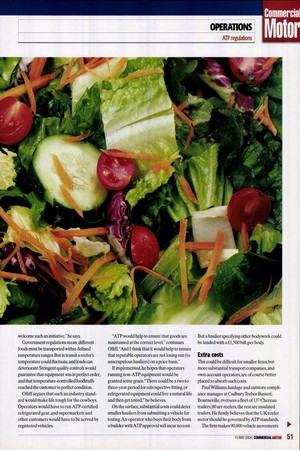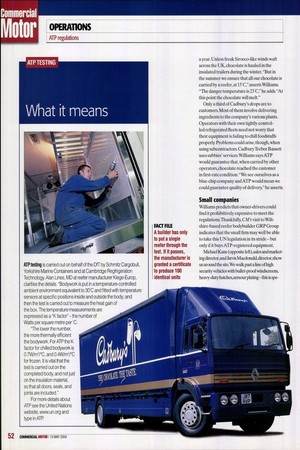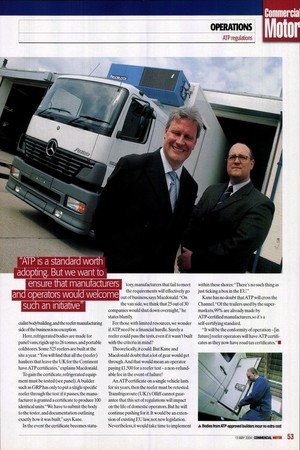THE RULE OF COOL
Page 50

Page 51

Page 52

Page 53

If you've noticed an error in this article please click here to report it so we can fix it.
The industry is already taped tight with regulations. So why do some reefer operators
want more? Tim Maughan reports.
Few UK operators are calling for greater legislative controls. Some operators and manufacturers in the specialist refrigerated sector, however, would like to see a tier of United Nations legislation applied to British reefer operators: ATP (Accorde Transport Perishables).
Simply put,ATP establishes strict temperature classifications for refrigerated equipment (both fridges and bodywork, see panel). These regulations apply only to the carriage of foodstuffs, so pharmaceuticals and other temperature-sensitive consignments are not covered by them. UK operators often lament the fact that
they are more heavily regulated than their European cousins, but, ironically,ATP is already in place on the ContinentAll reefer operators that run refrigerated gear in Europe must have the ATP certificate, and all British reefer operators delivering foodstuffs across the Channel must have it, too. Currently, there is no requirement for domestic operators to meet these regulations But Liam 011iff,Transfrigoroute (UK) secretary, argues that they should be introduced into the UK."We are exploring the whole position of introducing mandatory insulation levels;ATP is a standard worth adopting. But we want to ensure that manufacturers and operators would
welcome such an initiative," he says.
Government regulations mean different foods must be transported within defined temperature ranges. But in transit a reefer's temperature could fluctuate, and loads can deteriorate. Stringent quality controls would guarantee that equipment was in perfect order, and that temperature-controlled foodstuffs reached the customer in perfect condition.
01liff argues that such an industry standard would make life tough for the cowboys. Operators would have to run ATP-certified refrigerated gear, and supermarkets and other customers would have to be served by registered vehicles.
"ATP would help to ensure that goods are maintained at the correct level," continues 011ifL "And I think that it would help to ensure that reputable operators are not losing out (to unscrupulous hauliers) on a price basis."
If implemented, he hopes that operators running non-ATP equipment would be granted some grace. "There could be a two to three-year period for retrospective fitting, or refrigerated equipment could live a natural life and then get tested," he believes.
On the surface, substantial costs could deter smaller hauliers from submitting a vehicle for testing. An operator who buys their body from a builder with ATP approval will incur no cost.
But a haulier specifying other bodywork could be landed with a £1,500 bill, per body. Extra costs
This could be difficult for smaller firms, but more substantial transport companies, and own-account operators, are of course better placed to absorb such costs.
Paul Williams, haulage and outstore compliance manager at Cadbury Trebor Bassett, Boumeville, oversees a fleet of 137 Chereau trailers; 80 are reefers, the rest are insulated trailers. He firmly believes that the UK reefer sector should be governed by ATP standards. The firm makes 90,000 vehicle movements
a year. Unless freak Sirocco-like winds waft across the UK, chocolate is hauled in the insulated trailers during the winter. "But in the summer we ensure that all our chocolate is carried by a reefer, at 15°C," asserts Williams. "The danger temperature is 23°C," he adds. "At this point the chocolate will melt."
Only a third of Cadbury's drops are to customers. Most of them involve delivering ingredients to the company's various plants. Operators with their own tightly-controlled refrigerated fleets need not worry that their equipment is failing to chill foodstuffs properly. Problems could arise, though, when using subcontractors. Cadbury Trebor Bassett uses subbies' services.Williams says ATP would guarantee that, when carried by other operators, chocolate reached the customer in first-rate condition. "We see ourselves as a blue-chip company and ATP would mean we could guarantee quality of delivery," he asserts. Small companies
Williams predicts that owner-drivers could find it prohibitively expensive to meet the regulations.Thankfully, CM'S visit to Wiltshire-based reefer bodybuilder GRP Group indicates that the small firm may well be able to take this UN legislation in its stride — but only if it buys ATP-registered equipment. Michael Kane (opposite left),sales and marketing director,andJarvis Macdonald,director,show us around the site.We walk past aline of high security vehicles with bullet-proof windscreens, heavy-duty hatches,armour plating— this is spe
cialist bodybuilding,and the reefer manufacturing side of the business is no exception.
Here, refrigerated bodies are made for panel vans, rigids up to 26 tonnes, and portable coldstores. Some 525 reefers are built at the site a year."You will find that all the (reefer) hauliers that leave the UK for the Continent have ATP certificates," explains Macdonald.
To gain the certificate, refrigerated equipment must be tested (see panel).A builder such as GRP has only to put a single specific reefer through the test: if it passes, the manufacturer is granted a certificate to produce 100 identical units."We have to submit the body to the tester, and documentation outlining exactly how it was built," says Kane. In the event the certificate becomes statu
tory, manufacturers that fail to meet the requirements will effectively go out of business, says Macdonald."On the van side, we think that 25 out of 30 companies would shut down overnight," he states bluntly.
For those with limited resources, we wonder if ATP need be a financial hurdle. Surely a reefer could pass the tests, even if it wasn't built with the criteria in mind?
Theoretically, it could. But Kane and Macdonald doubt that a lot of gear would get through. And that would mean an operator paying £1,500 for a reefer test— a non-refundable fee in the event of failure! An ATP certificate on a single vehicle lasts for six years, then the reefer must be retested. Transfrigoroute (UK)'s 011iff cannot guarantee that this set of regulations will impact on the life of domestic operators. But he will continue pushing for it. It would be an extension of existing EU law, not new legislation. Nevertheless, it would take time to implement
within these shores: "There's no such thing as just ticking a box in the EU."
Kane has no doubt that ATP will cross the Channel."Of the trailers used by the supermarkets, 99% are already made by ATP-certified manufacturers, so it's a self-certifying standard. "It will be the conformity of operation— [in future] reefer operators will have ATP certificates as they now have road tax certificates."•
What it means
ATP testing is carried out on behalf of the DfT by Schmitz Cargobull, Yorkshire Marine Containers and at Cambridge Regfrigeration Technology Alan Lines, MD at reefer manufacturer Klege-Europ, clarifies the details. "Bodywork is put in a temperature-controlled ambient environment equivalent to 30°C and fitted with temperature sensors at specific positions inside and outside the body; and then the test is carried out to measure the heat gain of
the box. The temperature measurements are expressed as a "K factor" —the number of Watts per square metre per C.
"The lower the number, the more thermally efficient the bodywork. For ATP the K factor for chilled bodywork is 0.7W/m2/°C, and 0.4W/m2/°C for frozen. It is vital that the test is carried out on the completed body, and not just on the insulation material, so that all doors, seals, and joints are included."
For more details about ATP see the United Nations website, www.un.org and type in ATP.




















































































































































































































